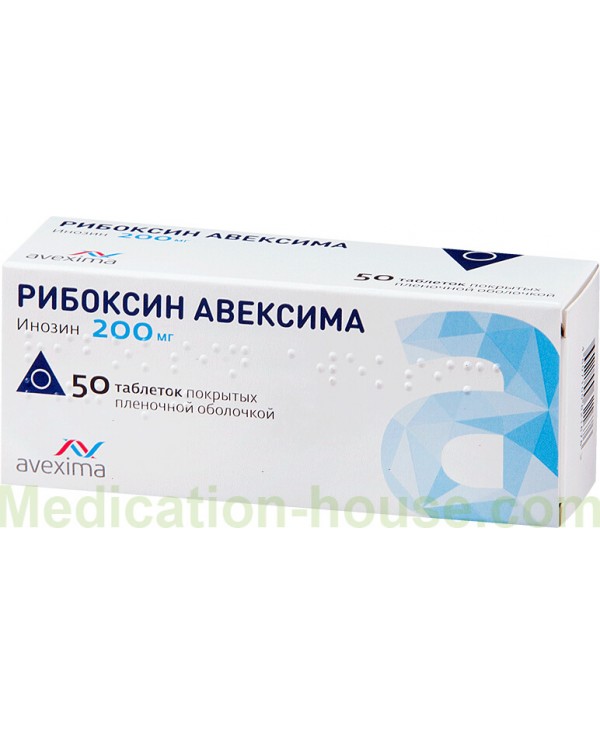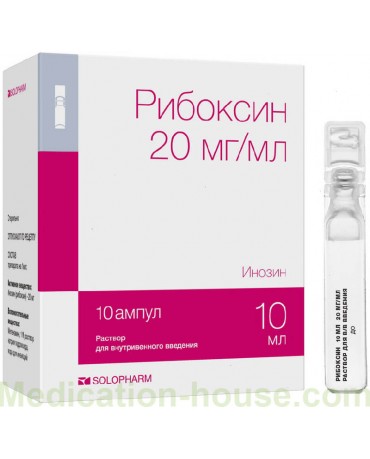Instruction for Riboxin
You can buy Riboxin on this page
Riboxin is a drug that regulates metabolic processes, has antihypoxic and antiarrhythmic effects.
Release form and composition
Film-coated tablets: round, biconvex, yellow; the core of the tablet is white or almost white (in a blister pack of 10 pcs., in a cardboard bundle of 1-5 or 10 packs; in a blister pack of 25 pcs., in a carton pack of 1-5 or 10 packs; 50 pcs. . in a polymer can, in a cardboard box 1 can; 50 pcs. in a glass jar of dark color, in a cardboard box 1 can);
Film-coated tablets: biconvex, from yellow-orange to light yellow, two layers are visible when cut (in a blister strip of 10 pcs., In a cardboard box 1, 2, 3, 4 or 5 packages);
1 film-coated tablet contains:
Active ingredient: inosine (riboxin) - 0.2 g;
Auxiliary components: lactose monohydrate, microcrystalline cellulose, copovidone, calcium stearate;
Shell composition: Opadray II (series 85) (macrogol-3350, partially hydrolyzed polyvinyl alcohol, titanium dioxide (E171), aluminum varnish based on dye sunset yellow (E110), aluminum varnish based on indigo carmine (E132), aluminum varnish based on dye quinoline yellow (E104), talc).
1 coated tablet contains:
Active ingredient: inosine - 0.2 g;
Auxiliary components: sugar, potato starch, titanium dioxide, water-soluble methylcellulose, tween-80, tropeolin O, stearic acid.
Pharmacodynamics
Riboxin is a drug that regulates metabolic processes. It belongs to the category of purine derivatives (nucleosides) and is a precursor of adenosine triphosphate (ATP). Riboxin is characterized by antiarrhythmic, metabolic and antihypoxic effects. It normalizes the energy balance of the myocardium, stabilizes coronary circulation, eliminates the consequences of intraoperative renal ischemia.
This substance is directly involved in glucose metabolism and activates metabolism in the absence of ATP and under conditions of hypoxia. Riboxin accelerates the metabolism of pyruvic acid, which helps to normalize the process of tissue respiration, and also provides activation of xanthine dehydrogenase. The drug stimulates the production of nucleotides and increases the activity of certain enzymes of the Krebs cycle. Riboxin penetrates cells, improving energy metabolism and positively affecting metabolic processes in the myocardium: the compound increases the strength of heart contractions and provides a more complete relaxation of the myocardium in diastole. As a result, the stroke volume of blood increases. Riboxin inhibits platelet aggregation and improves tissue regeneration (mainly the mucous membrane of the gastrointestinal tract and myocardium).
Pharmacokinetics
Riboxin is well absorbed from the digestive tract and metabolized in the liver, forming glucuronic acid, which is further oxidized. A small amount of the compound is excreted through the kidneys.
Indications for use
According to the instructions, the drug is used as part of complex therapy:
The period after myocardial infarction;
Coronary artery disease;
Violation of the rhythm of the heart against the background of the use of cardiac glycosides;
Myocardial dystrophy;
Liver diseases: fatty degeneration, hepatitis, cirrhosis;
Urokoproporphyria.
In addition, a solution for intravenous administration is prescribed during surgery on an isolated kidney for pharmacological protection when the blood circulation is turned off.
Contraindications
Age under 18;
Gout;
Hyperuricemia;
The period of pregnancy and breastfeeding;
Individual intolerance to the components of the drug.
In addition, the use of film-coated tablets is contraindicated in patients with lactase deficiency, lactose intolerance, glucose-galactose malabsorption.
It is recommended to prescribe the drug with caution to patients with renal insufficiency.
Instructions for the use of Riboxin: method and dosage
The tablets are taken orally before meals.
The recommended dosage regimen: at the beginning of therapy - 0.2 g 3-4 times a day, after 2-3 days of treatment (with adequate drug tolerance), the patient is transferred to receive 0.4 g 3 times a day. To achieve a therapeutic effect, a gradual increase in the dose is possible, but not more than up to 2.4 g per day. The duration of the course is 30-90 days.
For the treatment of urocoproporphyria, 0.2 g is prescribed 4 times a day for 30-90 days.
Side effects
Allergic reactions: possibly - flushing of the skin, itching;
Others: rarely - an increase in the level of uric acid in the blood, against the background of long-term therapy - exacerbation of gout.
In addition, the use of capsules and tablets Riboxin can cause an allergic reaction in the form of urticaria.
Overdose
With the introduction of Riboxin in high doses, the patient may experience an increase in the reactions of individual sensitivity to the drug. In this case, the drug is canceled and desensitizing therapy is prescribed. Sometimes there is an increase in the concentration of uric acid in the blood, causing an exacerbation of the condition in patients with gout and requiring the abolition of Riboxin.
Special instructions
It is not recommended to prescribe Riboxin to provide emergency care in case of cardiac dysfunction.
If skin hyperemia appears, immediate withdrawal of the drug is required.
The use of the drug should be accompanied by regular monitoring of the concentration of uric acid in urine and blood.
Does not affect the patient's ability to drive vehicles and mechanisms.
Drug interactions
The action of inosine as part of complex therapy increases the effectiveness of antianginal, antiarrhythmic, inotropic drugs.
Concomitant use of immunosuppressants (including antithymocyte immunoglobulin, gamma-D-glutamyl-D-tryptophan, cyclosporin) reduces the effectiveness of inosine.
No other clinically significant interactions of the drug have been established.
Terms and conditions of storage
Keep out of the reach of children and protected from light at temperatures up to 25 ° C, protect tablets and capsules from moisture.
Shelf life: tablets and solution - 3 years, capsules - 2 years.
Reviews
Mostly there are positive reviews about Riboxin. The drug has some side effects, the list of which will seem even more insignificant upon careful consideration of all its indications for use. Riboxin allows you to successfully fight the pathological conditions of the cardiovascular system.
In this case, the therapeutic effect of the drug is not limited only to the effect on the myocardium. Riboxin increases the activity of regeneration of the mucous membrane in destructive diseases of the gastrointestinal tract (for example, with gastritis). It also has a positive effect on the circulatory system and metabolic processes in the kidneys and other organ systems.
Doctors speak well of Riboxin and believe that its use can bring significant benefits when prescribed as indicated. Athletes and bodybuilders who use it to gain weight and improve performance often speak negatively about the drug. However, for these purposes, Riboxin was used only in the 1970s, after which it was proved that the drug did not have an anabolic effect leading to muscle building. Therefore, the course of taking the drug is comparable to the course of taking a conventional placebo.
Terms of sell
You don't need a prescription to buy Riboxin.


